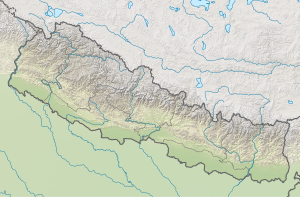Bethanchok Rural Municipality
Bethanchok (RM)
बेथानचोक गाउँपालिका | |
|---|---|
| Coordinates: 27°51′N 85°48′E / 27.850°N 85.800°E | |
| Country | |
| Province | Bagmati |
| District | Kavrepalanchowk |
| Wards | 6 |
| Established | 10 March 2017 |
| Government | |
| • Type | Rural Council |
| • President | Bhagawan Adhikari NC |
| • Vice-President | Tara Rana Timalsina CPN (Maoist) |
| Area | |
• Total | 101 km2 (39 sq mi) |
| Elevation | 300 m (1,000 ft) |
| Population (2011) | |
• Total | 16,777 |
| • Density | 170/km2 (430/sq mi) |
| Time zone | UTC+5:45 (Nepal Standard Time) |
| Headquarter | Dhungakharka |
| Website | https://bethanchowkmun.gov.np/ |
Bethanchok is a Rural municipality located within the Kavrepalanchowk District of the Bagmati Province of Nepal. The municipality spans 101 square kilometres (39 sq mi) of area, with a total population of 16,777 according to a 2011 Nepal census.[1][2]
On March 10, 2017, the Government of Nepal restructured the local level bodies into 753 new local level structures.[3][4] The previous Chyamrangbesi, Dhungakharka, Chalal Ganeshsthan, Chyasing Kharka and Bhugdeu Mahankal VDCs were merged to form Bethanchok Rural Municipality. Bethanchok is divided into 6 wards, with Dhungakharka declared the administrative center of the rural municipality.
Demographics
[edit]At the time of the 2011 Nepal census, Bethanchok Rural Municipality had a population of 16,777. Of these, 52.5% spoke Tamang, 43.7% Nepali, 2.5% Newar, 1.1% Magar and 0.1% other languages as their first language.[5]
In terms of ethnicity/caste, 52.9% were Tamang, 24.9% Hill Brahmin, 7.8% Chhetri, 7.0% Newar, 3.3% Magar, 2.3% Kami, 0.9% Damai/Dholi, 0.4% Gharti/Bhujel, 0.1% Sanyasi/Dasnami, 0.1% Thakuri and 0.2% others.[6]
In terms of religion, 52.7% were Buddhist, 46.2% Hindu, 0.8% Christian and 0.3% others.[7]
In terms of literacy, 67.5% could read and write, 2.4% could only read and 30.0% could neither read nor write.[8]
References
[edit]- ^ "District Corrected Last for RAJAPATRA" (PDF). www.mofald.gov.np. Retrieved 17 July 2018.
- ^ "स्थानीय तहहरुको विवरण" [Details of the local level bodies]. www.mofald.gov.np/en (in Nepali). Ministry of Federal Affairs and Local Development. Retrieved 17 July 2018.
- ^ "New local level structure comes into effect from today". www.thehimalayantimes.com. The Himalayan Times. 10 March 2017. Retrieved 17 July 2018.
- ^ "New local level units come into existence". www.kathmandupost.ekantipur.com. 11 March 2017. Retrieved 18 July 2018.
- ^ NepalMap Literacy [1]
- ^ NepalMap Caste [2]
- ^ NepalMap Religion [3]
- ^ NepalMap Literacy [4]
External links
[edit]



